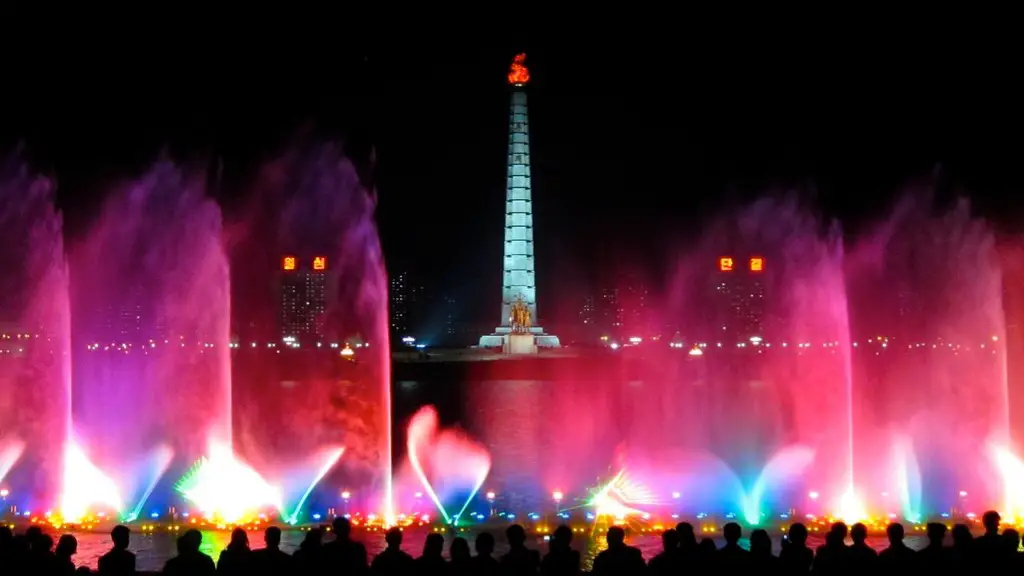Introduction
North Korea has long been one of the most isolated and secretive countries in the world, shrouded in mystery and shrouded in a culture of suspicion and mistrust. Coupled with an aggressive foreign policy, North Korea has become one of the most significant threats currently facing the international community. But why is North Korea such a threat? This article will examine the background of North Korea and discuss why it presents such a grave concern to the international community.
Background
The Democratic People’s Republic of Korea, known more colloquially as North Korea, is a reclusive, totalitarian state situated in East Asia, bordered by China and South Korea. Its system of government is based on the Juche ideology, which holds the military and its leader Kim Jong Un in highest esteem and glorify the state. Financial sanctions and severe economic mismanagement, due to its isolationism, has left most of the population with inadequate and unreliable access to food, clean drinking water, sanitation and access to basic healthcare.
Military Strength
North Korea’s military is renowned for its size and capability. With a large standing army of up to 1.2 million personnel, it poses a serious challenge for any adversary. It puts large emphasis on technological advancement and modernization, and it is estimated that it spends approximately 25% of its gross domestic product on its military, making it one of the most well-funded forces in the world. North Korea has developed a large nuclear arsenal, estimated between roughly 15-60 nuclear warheads. Additional armaments include short and long-range missiles, which are capable of reaching the continental US, and is estimated that North Korea has the capability to deliver a nuclear weapon on the US mainland with their advanced missiles.
Aggressive Foreign Policy
North Korea has a well established history of pursuing a hostile foreign policy towards the international community, and it is widely understood that North Korean security policies are intended to protect the state against perceived adversaries and protect the sovereignty of the secretive country. North Korea has has openly threatened its neighbours with military force, fired weapons over international recognised borders and publicly stated their intent to obtain nuclear weapons and dominate in East Asia.
Opposing Viewpoints
There is some consensus among experts that North Korea’s threat to the international community is real and not one easily ignored. However, there are some who take a more moderate view, suggesting that North Korea be treated as an adversary to be deterred rather than as a potential enemy to be destroyed. They also have suggested that North Korea should be fully integrated into the international community, which could lead to an end to its suspicious activities, enabling it to become a constructive force in international relations.
Political Leverage
North Korea has consistently used the threat of nuclear weapons and aggressive foreign policies as a way to gain political leverage over its adversaries. North Korea has used its influence to demand concessions from the international community while attempting to normalize its internal security policies. For instance, North Korea has assassinated political rivals in foreign countries and used cyber-attacks to extort resources and wealth from foreign governments. These tactics have consistently put international pressure on North Korea’s opponents and thus give the country a level of diplomatic power disproportionate to its size.
Intimidation Dynamics
North Korea has employed a variety of tactics to intimidate or destabilize neighbouring countries and regions. Attempts have been made to meddle in the politics of South Korea, frequent violations of international law have occurred into the economic zone of other countries, and cyber-attacks have been used to disrupt infrastructure or expose sensitive information. North Korea’s hostility is also visible through its oppressive domestic policies, which include the detention of citizens without due process and censorship of information related to international events.
Weapons of Mass Destruction
North Korea is believed to possess a large number of weapons of mass destruction, with its nuclear arsenal estimated at roughly 15-60 nuclear warheads and its missile delivery systems being capable of reaching the continental US. Additionally, North Korea produces chemical and biological weapons, with some estimates that its stockpile may contain extensive amounts of these weapons of mass destruction. This poses a major challenge to the international community as North Korea may use them as a way to impose its will or accomplish its goals.
Sanctions
The international community has imposed sanctions on North Korea in order to bring it in line with international standards and force it to conform to international norms. These sanctions, however, have not been effective in deterring North Korea from pursuing its aggressive foreign policy and have not succeeded in liberating its citizens from the oppressive state. The lack of success of these sanctions has further highlighted the magnitude of the challenge posed by North Korea’s belligerence.
Military Confrontation
Military conflict with North Korea has been discussed by some military and political analysts as a possibility. A large alliance of countries could launch an operation to liberate North Korean citizens and topple the government, as well as prevent it from further advancing its nuclear capabilities. However, such a move could also lead to an escalation of tensions in the region and may even result in a full-on nuclear exchange with catastrophic consequences.
Economic Marginalization
North Korea relies heavily on foreign trade to support its economy. Its isolation from international organizations and its frequent violations of international law have alienated it from many countries, reducing the amount of foreign investment and trade. Furthermore, its focus on military strength and development of nuclear weapons has further deterred foreign countries from engaging with North Korea, leaving it with limited access to resources and technology.
International Negotiations
International negotiations have been ongoing between North Korea and the international community in an attempt to reach a long-term resolution and a peaceful solution. However, these talks have yielded little in the way of tangible results and North Korea has continued to pursue destructive and aggressive policies with the possibility of larger-scale conflict. As a result, the threat posed by North Korea remains undiminished and must be addressed.



